Travel News
Amsterdam Hub to Halt Night Flights, Ban Private Jets to Cut CO2 - BLOOMBERG
BY , Bloomberg News
(Bloomberg) -- Schiphol Airport, a key European transfer hub, plans to stop late night flights and ban private jets to reduce noise and lower CO2 emissions.
Aircraft will no longer take off between midnight and 6 a.m. at the Amsterdam hub once the changes go into effect in the next two to three years, the airport said in a statement on Tuesday. There will be no more landings between midnight and 5 a.m.
The moves are part of a push to reduce noise and carbon emissions in line with the Paris climate accord. Private jets and small business aviation cause a “disproportionate” amount of noise and CO2 pollution and will be banned, the airport said. Schiphol is also scrapping plans for an additional runway.
The new rules, which will mean 10,000 fewer night flights annually, come after the Dutch government proposed slashing the airport’s annual capacity by as much as 12% to 440,000 flights by 2024 — an effort that’s being challenged at court by airlines.
“Our choices may have significant implications for the aviation industry, but they are necessary,” Royal Schiphol Group Chief Executive Officer Ruud Sondag said. “This shows we mean business.”
The Dutch arm of Air France-KLM said it was surprised by Schiphol’s proposals, which have “far-reaching consequences” for airlines. KLM, which accounts for close to 60% of traffic at Schiphol, will join other aviation organizations in submitting its vision on the plans to the Dutch infrastructure ministry by June 15, it said in a statement.
While cargo flights will have to adhere to tighter rules for noisier aircraft and night closures, Schiphol wants to keep 2.5% of the take-off and landing slots available for such planes. “Due to international slot regulations, cargo flights are currently struggling to keep their slots at Schiphol,” the company said.
Special Report: Tesla workers shared sensitive images recorded by customer cars - REUTERS
- Private camera recordings, captured by cars, were shared in chat rooms: ex-workers
- Circulated clips included one of child being hit by car: ex-employees
- Tesla says recordings made by vehicle cameras ‘remain anonymous’
- One video showed submersible vehicle from James Bond film, owned by Elon Musk
LONDON/SAN FRANCISCO, April 6 (Reuters) - Tesla Inc assures its millions of electric car owners that their privacy “is and will always be enormously important to us.” The cameras it builds into vehicles to assist driving, it notes on its website, are “designed from the ground up to protect your privacy.”
But between 2019 and 2022, groups of Tesla employees privately shared via an internal messaging system sometimes highly invasive videos and images recorded by customers’ car cameras, according to interviews by Reuters with nine former employees.
Advertisement · Scroll to continueReport an ad
Some of the recordings caught Tesla customers in embarrassing situations. One ex-employee described a video of a man approaching a vehicle completely naked.
Also shared: crashes and road-rage incidents. One crash video in 2021 showed a Tesla driving at high speed in a residential area hitting a child riding a bike, according to another ex-employee. The child flew in one direction, the bike in another. The video spread around a Tesla office in San Mateo, California, via private one-on-one chats, “like wildfire,” the ex-employee said.
Other images were more mundane, such as pictures of dogs and funny road signs that employees made into memes by embellishing them with amusing captions or commentary, before posting them in private group chats. While some postings were only shared between two employees, others could be seen by scores of them, according to several ex-employees.
Tesla states in its online “Customer Privacy Notice” that its “camera recordings remain anonymous and are not linked to you or your vehicle.” But seven former employees told Reuters the computer program they used at work could show the location of recordings – which potentially could reveal where a Tesla owner lived.
One ex-employee also said that some recordings appeared to have been made when cars were parked and turned off. Several years ago, Tesla would receive video recordings from its vehicles even when they were off, if owners gave consent. It has since stopped doing so.
“We could see inside people's garages and their private properties,” said another former employee. “Let's say that a Tesla customer had something in their garage that was distinctive, you know, people would post those kinds of things.”
Tesla didn't respond to detailed questions sent to the company for this report.
About three years ago, some employees stumbled upon and shared a video of a unique submersible vehicle parked inside a garage, according to two people who viewed it. Nicknamed “Wet Nellie,” the white Lotus Esprit sub had been featured in the 1977 James Bond film, “The Spy Who Loved Me.”
The vehicle’s owner: Tesla Chief Executive Elon Musk, who had bought it for about $968,000 at an auction in 2013. It is not clear whether Musk was aware of the video or that it had been shared.

Musk didn’t respond to a request for comment.
To report this story, Reuters contacted more than 300 former Tesla employees who had worked at the company over the past nine years and were involved in developing its self-driving system. More than a dozen agreed to answer questions, all speaking on condition of anonymity.
Reuters wasn’t able to obtain any of the shared videos or images, which ex-employees said they hadn’t kept. The news agency also wasn’t able to determine if the practice of sharing recordings, which occurred within some parts of Tesla as recently as last year, continues today or how widespread it was. Some former employees contacted said the only sharing they observed was for legitimate work purposes, such as seeking assistance from colleagues or supervisors.
LABELING PEDESTRIANS AND STREET SIGNS
The sharing of sensitive videos illustrates one of the less-noted features of artificial intelligence systems: They often require armies of human beings to help train machines to learn automated tasks such as driving.
Since about 2016, Tesla has employed hundreds of people in Africa and later the United States to label images to help its cars learn how to recognize pedestrians, street signs, construction vehicles, garage doors and other objects encountered on the road or at customers’ houses. To accomplish that, data labelers were given access to thousands of videos or images recorded by car cameras that they would view and identify objects.
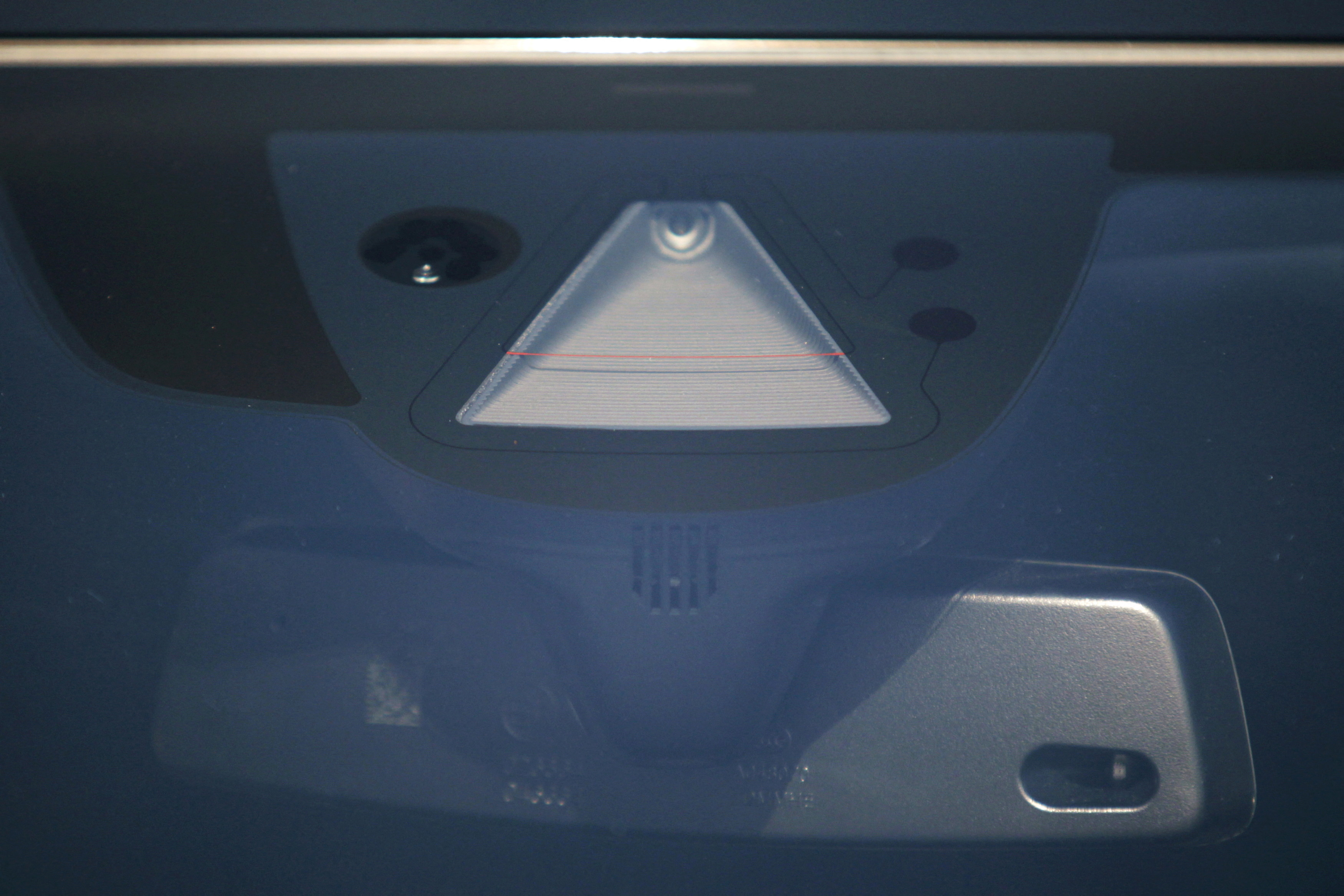
Tesla increasingly has been automating the process, and shut down a data-labeling hub last year in San Mateo, California. But it continues to employ hundreds of data labelers in Buffalo, New York. In February, Tesla said the staff there had grown 54% over the previous six months to 675.
Two ex-employees said they weren’t bothered by the sharing of images, saying that customers had given their consent or that people long ago had given up any reasonable expectation of keeping personal data private. Three others, however, said they were troubled by it.
“It was a breach of privacy, to be honest. And I always joked that I would never buy a Tesla after seeing how they treated some of these people,” said one former employee.
Another said: “I’m bothered by it because the people who buy the car, I don't think they know that their privacy is, like, not respected … We could see them doing laundry and really intimate things. We could see their kids.”
One former employee saw nothing wrong with sharing images, but described a function that allowed data labelers to view the location of recordings on Google Maps as a “massive invasion of privacy.”
David Choffnes, executive director of the Cybersecurity and Privacy Institute at Northeastern University in Boston, called sharing of sensitive videos and images by Tesla employees “morally reprehensible.”
“Any normal human being would be appalled by this,” he said. He noted that circulating sensitive and personal content could be construed as a violation of Tesla’s own privacy policy — potentially resulting in intervention by the U.S. Federal Trade Commission, which enforces federal laws relating to consumers’ privacy.
A spokesperson for the FTC said it doesn’t comment on individual companies or their conduct.
To develop self-driving car technology, Tesla collects a vast trove of data from its global fleet of several million vehicles. The company requires car owners to grant permission on the cars’ touchscreens before Tesla collects their vehicles’ data. “Your Data Belongs to You,” states Tesla’s website.
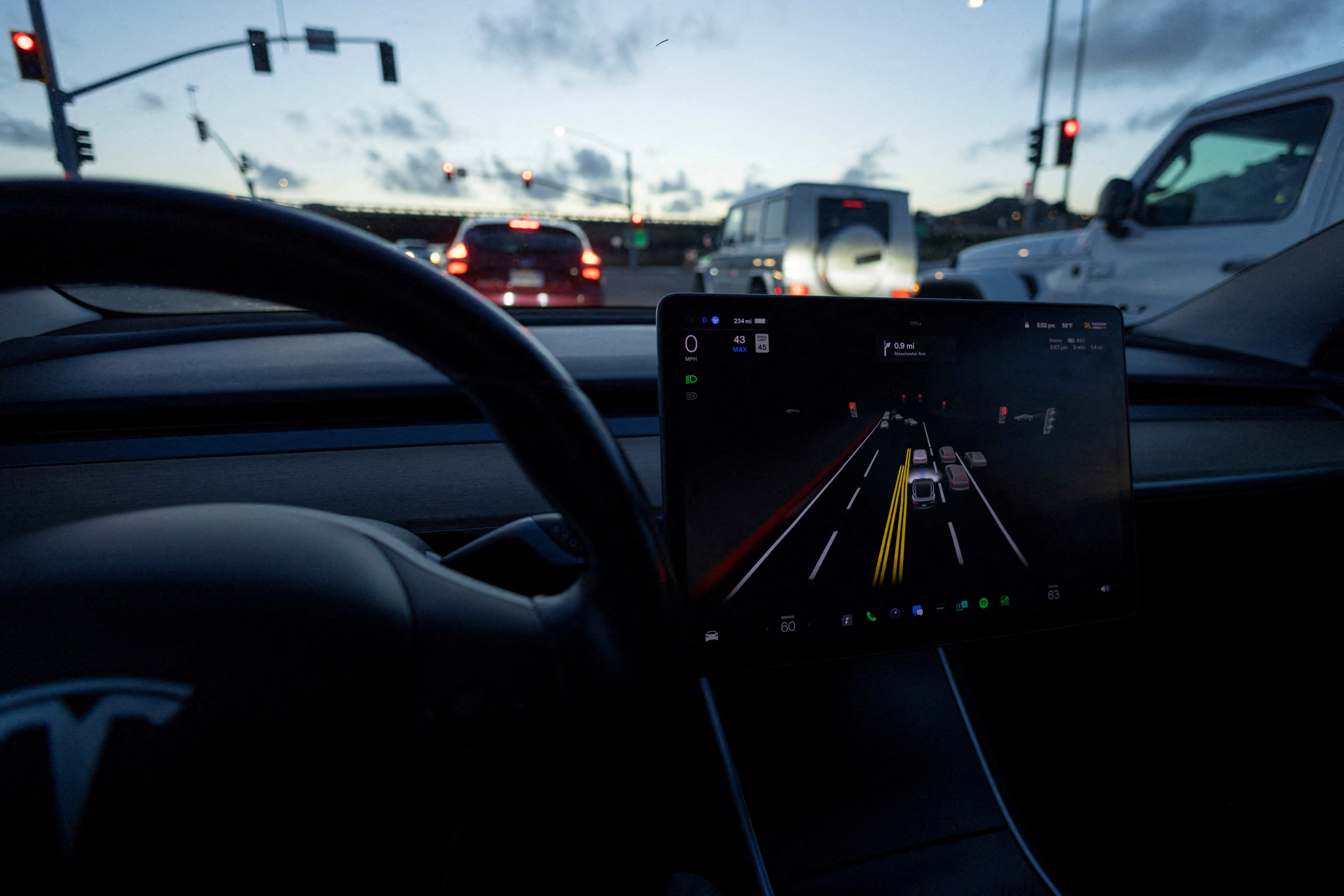
In its Customer Privacy Notice, Tesla explains that if a customer agrees to share data, “your vehicle may collect the data and make it available to Tesla for analysis. This analysis helps Tesla improve its products, features, and diagnose problems quicker.” It also states that the data may include “short video clips or images,” but isn’t linked to a customer’s account or vehicle identification number, “and does not identify you personally.”
Carlo Piltz, a data privacy lawyer in Germany, told Reuters it would be difficult to find a legal justification under Europe’s data protection and privacy law for vehicle recordings to be circulated internally when it has “nothing to do with the provision of a safe or secure car or the functionality” of Tesla's self-driving system.
In recent years, Tesla’s car-camera system has drawn controversy. In China, some government compounds and residential neighborhoods have banned Teslas because of concerns about its cameras. In response, Musk said in a virtual talk at a Chinese forum in 2021: “If Tesla used cars to spy in China or anywhere, we will get shut down.”
Elsewhere, regulators have scrutinized the Tesla system over potential privacy violations. But the privacy cases have tended to focus not on the rights of Tesla owners but of passers-by unaware that they might be being recorded by parked Tesla vehicles.
In February, the Dutch Data Protection Authority, or DPA, said it had concluded an investigation of Tesla over possible privacy violations regarding “Sentry Mode,” a feature designed to record any suspicious activity when a car is parked and alert the owner.
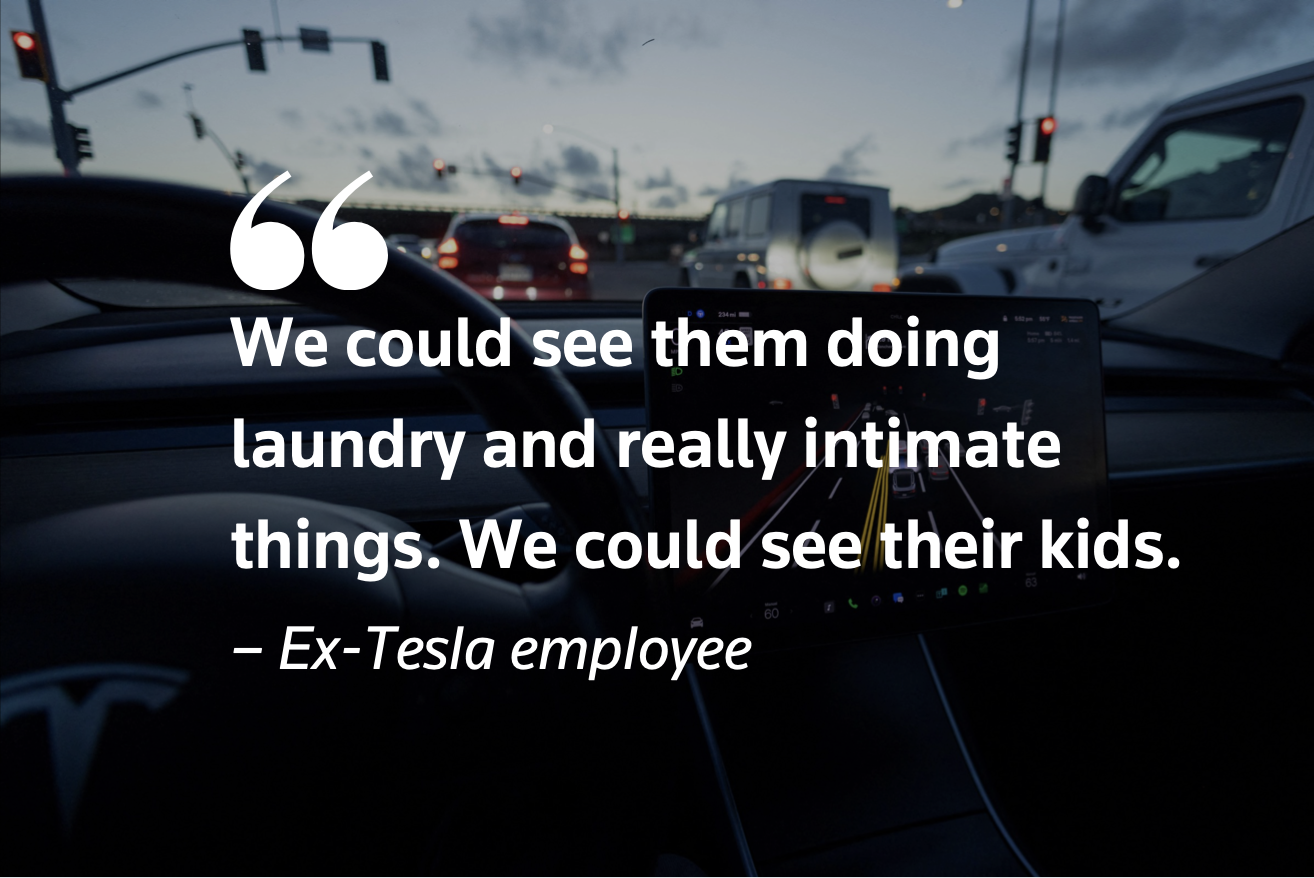
“People who walked by these vehicles were filmed without knowing it. And the owners of the Teslas could go back and look at these images,” said DPA board member Katja Mur in a statement. “If a person parked one of these vehicles in front of someone’s window, they could spy inside and see everything the other person was doing. That is a serious violation of privacy.”
The watchdog determined it wasn’t Tesla, but the vehicles’ owners, who were legally responsible for their cars’ recordings. It said it decided not to fine the company after Tesla said it had made several changes to Sentry Mode, including having a vehicle’s headlights pulse to inform passers-by that they may be being recorded.
A DPA spokesperson declined to comment on Reuters findings, but said in an email: “Personal data must be used for a specific purpose, and sensitive personal data must be protected.”
REPLACING HUMAN DRIVERS
Tesla calls its automated driving system Autopilot. Introduced in 2015, the system included such advanced features as allowing drivers to change lanes by tapping a turn signal and parallel parking on command. To make the system work, Tesla initially installed sonar sensors, radar and a single front-facing camera at the top of the windshield. A subsequent version, introduced in 2016, included eight cameras all around the car to collect more data and offer more capabilities.
Musk’s future vision is eventually to offer a “Full Self-Driving” mode that would replace a human driver. Tesla began rolling out an experimental version of that mode in October 2020. Although it requires drivers to keep their hands on the wheel, it currently offers such features as the ability to slow a car down automatically when it approaches stop signs or traffic lights.
Tesla's Autopilot system
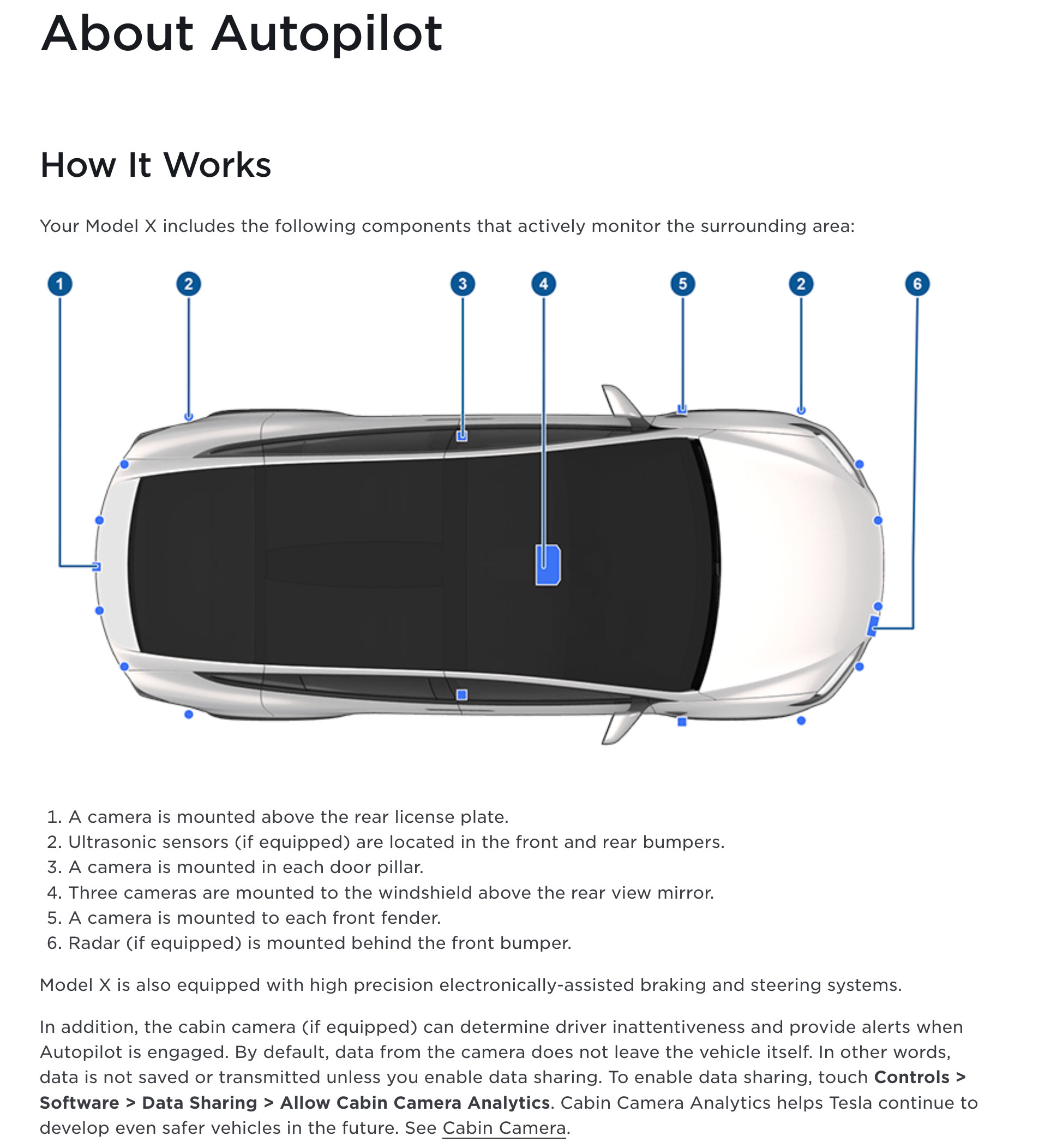
In February, Tesla recalled more than 362,000 U.S. vehicles to update their Full Self-Driving software after the National Highway Traffic Safety Administration said it could allow vehicles to exceed speed limits and potentially cause crashes at intersections.
As with many artificial-intelligence projects, to develop Autopilot, Tesla hired data labelers to identify objects in images and videos to teach the system how to respond when the vehicle was on the road or parked.
Tesla initially outsourced data labeling to a San Francisco-based non-profit then known as Samasource, people familiar with the matter told Reuters. The organization had an office in Nairobi, Kenya, and specialized in offering training and employment opportunities to disadvantaged women and youth.
In 2016, Samasource was providing about 400 workers there for Tesla, up from about an initial 20, according to a person familiar with the matter.
By 2019, however, Tesla was no longer satisfied with the work of Samasource’s data labelers. At an event called Tesla AI Day in 2021, Andrej Karpathy, then senior director of AI at Tesla, said: “Unfortunately, we found very quickly that working with a third party to get data sets for something this critical was just not going to cut it … Honestly the quality was not amazing.”
A former Tesla emp loyee said of the Samasource labelers: “They would highlight fi re hydrants as pedestrians … They would miss objects all the time. Their skill level to draw boxes was very low.”
Samasource, now called Sama, declined to comment on its work for Tesla.
Tesla decided to bring data labeling in-house. “Over time, we’ve grown to more than a 1,000-person data labeling (organization) that is full of professional labelers who are working very closely with the engineers,” Karpathy said in his August 2021 presentation.
Karpathy didn’t respond to requests for comment.
Tesla’s own data labelers initially worked in the San Francisco Bay area, including the office in San Mateo. Groups of data labelers were assigned a variety of different tasks, including labeling street lane lines or emergency vehicles, ex-employees said.
At one point, Teslas on Autopilot were having difficulty backing out of garages and would get confused when encountering shadows or objects such as garden hoses. So some data labelers were asked to identify objects in videos recorded inside garages. The problem eventually was solved.
In interviews, two former employees said in their normal work duties they were sometimes asked to view images of customers in and around their homes, including inside garages.
“I sometimes wondered if these people know that we're seeing that,” said one.
“I saw some scandalous stuff sometimes, you know, like I did see scenes of intimacy but not nudity,” said another. “And there was just definitely a lot of stuff that like, I wouldn't want anybody to see about my life.”
As an example, this person recalled seeing “embarrassing objects,” such as “certain pieces of laundry, certain sexual wellness items … and just private scenes of life that we really were privy to because the car was charging.”
MEMES IN THE SAN MATEO OFFICE
Tesla staffed its San Mateo office with mostly young workers, in their 20s and early 30s, who brought with them a culture that prized entertaining memes and viral online content. Former staffers described a free-wheeling atmosphere in chat rooms with workers exchanging jokes about images they viewed while labeling.
According to several ex-employees, some labelers shared screenshots, sometimes marked up using Adobe Photoshop, in private group chats on Mattermost, Tesla’s internal messaging system. There they would attract responses from other workers and managers. Participants would also add their own marked-up images, jokes or emojis to keep the conversation going. Some of the emojis were custom-created to reference office inside jokes, several ex-employees said.
One former labeler described sharing images as a way to “break the monotony.” Another described how the sharing won admiration from peers.
“If you saw something cool that would get a reaction, you post it, right, and then later, on break, people would come up to you and say, ‘Oh, I saw what you posted. That was funny,’” said this former labeler. “People who got promoted to lead positions shared a lot of these funny items and gained notoriety for being funny.”
Some of the shared content resembled memes on the internet. There were dogs, interesting cars, and clips of people recorded by Tesla cameras tripping and falling. There was also disturbing content, such as someone being dragged into a car seemingly against their will, said one ex-employee.
Video clips of crashes involving Teslas were also sometimes shared in private chats on Mattermost, several former employees said. Those included examples of people driving badly or collisions involving people struck while riding bikes – such as the one with the child – or a motorcycle. Some data labelers would rewind such clips and play them in slow motion.
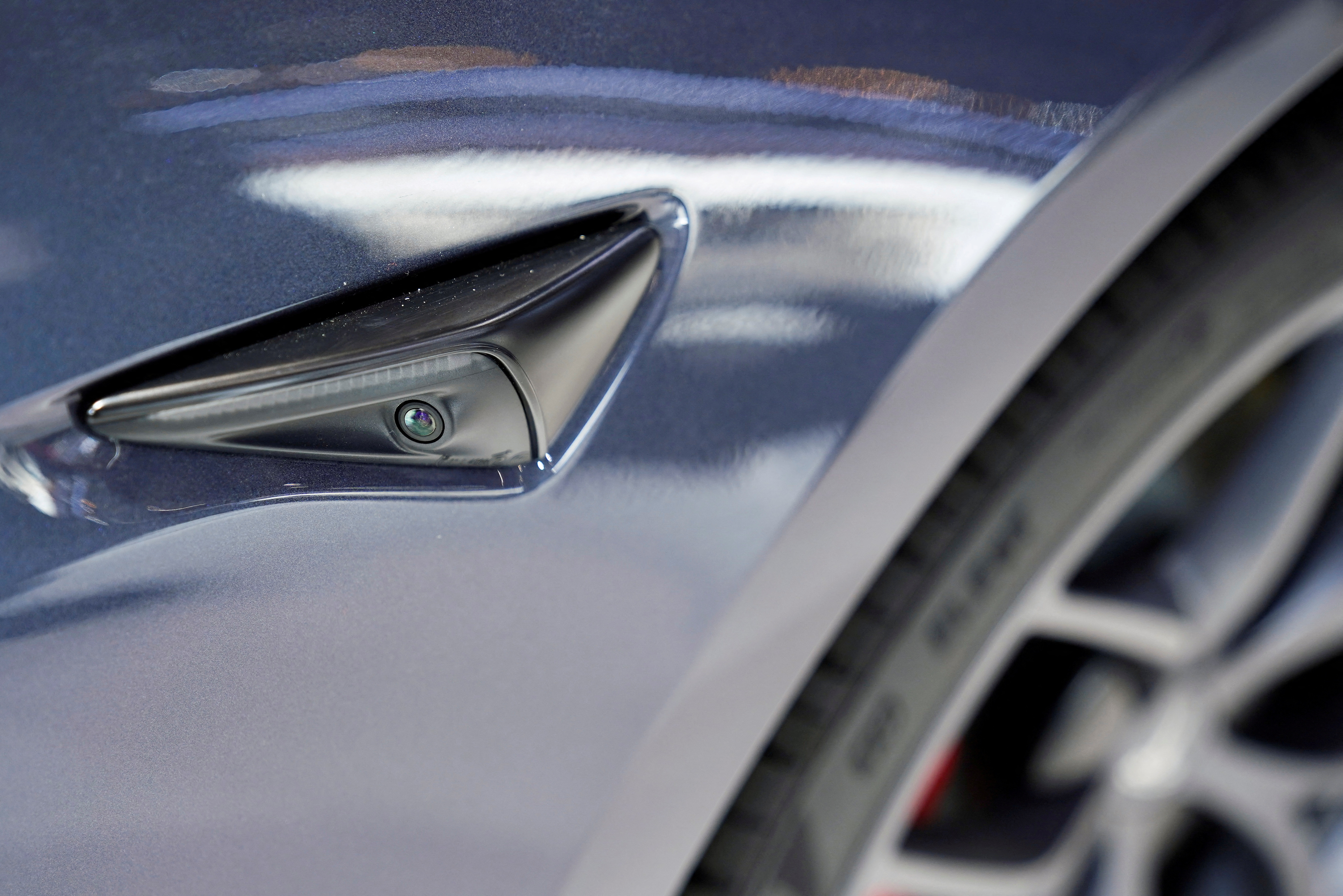
At times, Tesla managers would crack down on inappropriate sharing of images on public Mattermost channels since they claimed the practice violated company policy. Still, screenshots and memes based on them continued to circulate through private chats on the platform, several ex-employees said. Workers shared them one-on-one or in small groups as recently as the middle of last year.
One of the perks of working for Tesla as a data labeler in San Mateo was the chance to win a prize – use of a company car for a day or two, according to two former employees.
But some of the lucky winners became paranoid when driving the electric cars.
“Knowing how much data those vehicles are capable of collecting definitely made folks nervous," one ex-employee said.
Reported by Steve Stecklow and Waylon Cunningham in London and Hyunjoo Jin in San Francisco. Edited by Peter Hirschberg.
Airlines’ Operating License Now Valid For 5 Years – NCAA - DAILY TRUST
The Nigerian Civil Aviation Authority (NCAA), has said Air Operator Certificate (AOC) license for airlines offering scheduled flight operations will now be valid for 5…
- By Chris Agabi
The Nigerian Civil Aviation Authority (NCAA), has said Air Operator Certificate (AOC) license for airlines offering scheduled flight operations will now be valid for 5 years as against the three years the regulation previously allowed.
The NCAA also said for non-scheduled operators like private jets operators, their license will now be valid for three years.
He said this is contained in the proposed amendment to the Nigeria Civil Aviation Regulations (Nig. CARs).
In the proposed regulation, remotely piloted aircraft (drones) will also be officially regulated.
The regulation also features amendments to penalties for fractions and other critical amendments.
Speaking at the stakeholders’ engagements Captain Musa Nuhu, the Director General NCAA said the Stakeholders’ consultation coming shortly after the publication of the Civil Aviation Act 2022 is to get critical inputs into the regulations before they are published.
Air Canada, WestJet rank last for on-time performance in February - YAHOO FINANCE
Canada's two biggest airlines had the worst on-time performance among 10 North American airlines in the month of February, according to aviation analytics firm Cirium.
The on-time performance report, released last week, showed that out of 10 North American airlines tracked by the data company, WestJet Airlines ranked 9th, with 63 per cent of the more than 13,000 flights flown in the month of February landing on time. Air Canada (AC.TO) was the only airline that had a worse on-time performance rate in North America, with 57 per cent of the nearly 27,000 flights flown in February landing on time, according to Cirium.
Cirium tracks performance for major airlines in the United States and Canada, including ones that were not included in the ranking. A spokesperson for the company said the rankings include only the airlines for which Cirium has coverage for at least 80 per cent of flights by that airline.
U.S. carrier Delta Airlines (DAL) had the best on-time performance in North America, with 85 per cent of the more than 119,000 flights flown in February landing on time. Southwest Airlines (LUV) had 82 per cent of its nearly 104,000 flights land on time, while American Airlines (AAL) had 82 per cent of the more than 151,000 flights land on time.
Air Canada's on-time performance rate was well below carriers that flew a similar amount of flights in February. Alaska Airlines, which flew nearly 30,000 flights compared to Air Canada's 27,000, had an on-time arrival rate of 80 per cent. Spirit Airlines (nearly 23,000 flights) had an on-time performance rate of 77 per cent while Jet Blue (27,000 flights) had a rate of 74 per cent. Frontier Airlines, which flew 39 more flights than WestJet in February, had an on-time performance rate of 71 per cent compared to WestJet's 63 per cent.
Still, the results are an improvement for Air Canada and WestJet compared to their total on-time rate through 2022, a year that was marred by delays, cancellations and airport chaos across the country. In 2022, WestJet had an on-time performance rate of 59 per cent across nearly 95,000 flights, while Air Canada's rate was 55 per cent over nearly 151,000 flights.
The airline sector in Canada is still recovering from the COVID-19 pandemic. Air Canada said on its latest quarterly conference call that it will boost 2023 capacity by 24 per cent compared to 2022, bringing it to 90 per cent of pre-pandemic levels. The airline expects it will match pre-pandemic capacity by 2024.
Alicja Siekierska is a senior reporter at Yahoo Finance Canada. Follow her on Twitter @alicjawithaj.
Amazon Prime’s First African Original Movie to Premiere in Lagos - BLOOMBERG
BY , Bloomberg News
(Bloomberg) -- Amazon.com Inc.’s Prime Video premiered its first African original title, filmed in Nigeria, in Lagos Thursday ahead of its debut on the streaming platform Friday.
Crime thriller Gangs of Lagos is set in the center of Nigeria’s commercial hub, and tells the story of a group of childhood friends trying to navigate life in a bustling, overcrowded neighborhood, Prime said in a statement.
Amazon’s streaming division has been pushing to boost its subscriber base on the continent, which has the world’s youngest and fastest growing population. The film industry in Nigeria, where Amazon competes with rivals including Netflix Inc., Disney+, Showmax and local video-on-demand platforms, produces more movies than Hollywood.
Screenings of Gangs of Lagos will be held later this month in London and New York. It was directed and produced by Nigerian filmmaker Jade Osiberu, whose Greoh Studios has an exclusive deal with Prime.
Amazon Prime began operating in Africa in 2016 and introduced a local version of its service to Nigeria in 2021. It currently has about 143 licensed acquisitions, which include non-exclusive content, a company spokesperson said.
It signed licensing deals with local producers Inkblot and Anthill Studios last year. Inkblot produced Netflix’s first Nigerian young adult show, Far From Home.
Amazon is planning to launch its first South African original, an unscripted comedy series hosted by Trevor Noah called Last One Laughing, in 2024. A Nigerian version of the show is planned for later this year.
The expansion of the Nigerian studio relies on local talent, mirroring their model in at least twenty other countries, according to Ned Mitchell, head of Prime’s Africa and Middle East Originals.
“It’s more comfortable for creators to be able to speak with someone who understands their story and their lived experience and who can champion their point of view,” Mitchell said in an interview. “There are a number of originals in the pipeline.”
The film’s reception will serve as the latest litmus test for the international appeal of the world’s second-biggest film industry, known as Nollywood. Nigeria produced 2,500 films in 2021, according to UNESCO, far exceeding Hollywood’s output. However, the industry’s productivity has not always been matched by quality.
While Amazon declined to provide exact budget figures for Gangs of Lagos, their plan is to raise Nollywood production to global standards, Mitchell said.
“What we’re doing is spending a significant amount of time and resources on development and prep and all these things that typically creators aren’t able to do because of budgets and timelines that they face,” he added. “We focus on quality over quantity.”
(Updates with additional quotes from Amazon in last two paragraphs)
FULL LIST: UK stops recruiting healthcare workers from Nigeria, 53 others - PUNCH
By Lara Adejoro
The United Kingdom has placed Nigeria and 53 other countries on the red list of countries that should not be actively targeted for recruitment by health and social care employers.
The announcement was contained in the revised code of practice for the international recruitment of health and social care personnel in England.
It is recommended that employers, recruitment organisations, agencies, collaborations, and contracting bodies check the red country list for updates before any recruitment drive.
It defined active international recruitment in the code as the process by which UK health and social care employers (including local authorities), contracting bodies, recruitment organisations, agencies, collaborations, and sub-contractors target individuals to market UK employment opportunities, with the intention of recruiting to a role in the UK health or social care sector. It includes both physical or virtual targeting, and whether or not these actions lead to substantive employment.
The code of practice applies to the appointment of all international health and social care personnel in the UK, including all permanent, temporary, and locum staff in clinical and non-clinical settings.
This includes but is not limited to allied health professionals, care workers, dentists, doctors, healthcare scientists, medical staff, midwives, nursing staff, residential and domiciliary care workers, social workers, and support staff.
Recall that in 2021, the UK suspended the recruitment of healthcare workers from Nigeria and 46 other countries, noting that the increasing scale of health and social care worker migration from low and lower-middle-income countries threatens the achievement of their nation’s health and social care goals.
The WHO on March 8, 2023, listed Nigeria and other 54 countries as facing the most pressing health workforce challenges related to universal health coverage.
The red and amber country list does not, however, prevent individual health and social care personnel resident in countries on the list from making a direct application to health and social care employers, but rather without being targeted by a third party, such as a recruitment organisation, agency or recruitment collaboration.
The PUNCH reports that there are currently 11,055 Nigerian-trained doctors in the UK, based on statistics obtained from the UK General Medical Council, the government body that maintains the official register of medical practitioners.
Nigeria has the third highest number of foreign doctors working in the UK after India, and Pakistan.
The UK, however, in its revised code of practice said the health and social care organisations in England do not actively recruit from those countries the WHO recognises as having the most pressing health and care workforce-related challenges unless there is a government-to-government agreement to support managed recruitment activities.
The countries placed on the red list of ‘No active recruitment’ in alphabetical order are Afghanistan, Angola, Bangladesh, Benin, Burkina Faso, Burundi, Cameroon, Central African Republic, Chad, Comoros, Congo, Democratic Republic of Congo, Côte d’Ivoire, Djibouti, Equatorial Guinea, Eritrea, Ethiopia, Gabon, The Gambia, Ghana, Guinea, Guinea-Bissau, Haiti, Kiribati, Lao People’s Democratic Republic, Lesotho, Liberia.
Other countries are Madagascar, Malawi, Mali, Mauritania, Federated States of Micronesia, Mozambique, Niger, Nigeria, Pakistan, Papua New Guinea, Rwanda, Samoa, Senegal, Sierra Leone, Solomon Islands, Somalia, South Sudan, Sudan, United Republic of Tanzania, Timor-Leste, Togo, Tuvalu, Uganda, Vanuatu, Republic of Yemen, Zambia, and Zimbabwe.
Bird strike disrupts flight at Abuja airport - PUNCH
An Abuja-bound Air Peace flight was affected by a bird strike while landing on Saturday.
The PUNCH reports that a bird strike refers to a situation where a bird collides with an aircraft during takeoff, landing, or while the plane is in flight.
A statement by the management of Air Peace noted that the aircraft which took off from Asaba, Delta State capital, landed safely and passengers disembarked safely.
However, the airline further empathised with customers whose flights were disrupted as a result of the incident, adding that an arrangement was made for another aircraft to operate on the rotation.
The statement read, “This is to inform the flying public and our esteemed customers that our Asaba-Abuja flight- P47866- had a bird strike upon landing in Abuja on Saturday, April 8, 2023,” the statement read.
“The aircraft, with Registration Number ES-SAZ, landed safely and passengers disembarked normally.
“While we deeply empathise with passengers whose flights have been consequently affected by this unforeseen development, the arrangement was made for another aircraft to operate Abuja-Asaba, Asaba-Lagos and other flights on that rotation.
“Be assured of our strict compliance with established safety standards.”
Efforts to reach the General Manager, Public Affairs, Nigerian Safety and Investigation Bureau, Tunji Oketunbi, proved abortive at the time of filling this report.
Travelers allegedly get kicked out of flight after arguing over luggage size: ‘Everyone was staring’ - YAHOO NEWS
A woman is going after Frontier Airlines after she says an employee tried to charge her group for oversized carry-ons when the woman claimed they didn’t have any.
The story was shared by journalist @dyanavilla.tv, who filmed the whole ordeal in a 25-part TikTok series that has since gone viral.
“Please make this go viral!” the caption on the first post read. “The frontier front desk and supervisor were not cooperating with their guest. PLEASE HELP US GET THIS TO FRONTIER!”
In the clip, a small group of women can be seen checking the size of their carry-ons at their gate — and to show they all comply with the requirements.
“Ma’am, these bags fit,” the person behind the camera tells a gate agent standing several feet away.
But even after showing that they fit within the parameters, the employee was apparently not satisfied.
“They don’t fit if you’re forcing them down,” the gate agent replies, which only confuses the women further.
The travelers repeatedly place their bags inside the “bag check” station and ask the attendant multiple to explain why they don’t fit, but she doesn’t appear to reply. At one point, they grow so irritated that one of the women says, “You’re acting like you own the freakin’ airline!”
Eventually, the employee walks over and tells them the bags don’t truly fit because the women are pushing down on them. But in turn, the women all say that they are not, and they refuse to pay the extra $100 bag fee the employee tries to impose on them.
After the first few videos started to go viral, one of the women — Sandra Romero — got on camera and tried to share more of the story.
According to Romero, she felt “ashamed” and “discriminated against” by the Frontier employees and noticed that it was only herself and two other Hispanic women who were stopped and humiliated over their bag size.
In a statement to In The Know, a representative for Frontier said, “The video fails to show that the customer using the sizer box had an additional carry-on bag. Each customer is allowed one free personal item that must fit within the smaller sizer box. This customer had more than one bag and they were not able to combine them into a single bag that fit in the personal item box.”
“I even told her that I was going to be late to my job,” Romero shared. “And they didn’t care.”
“Allowing these customers to board without paying would be inequitable to every other customer who was already onboard with paid bags,” the Frontier representative added.
Eventually, Romero tried to make her bag even smaller by digging through the carry-on and throwing out several articles of clothing.
“Everybody was staring at me because I had to pull out all my underwear and bras,” Romero said of the embarrassing experience.
In several follow-up videos, Romeo and Villa explain that they were ultimately not allowed on the flight and were told it was because they were filming and holding up the line of other passengers. They then had to re-book pricier tickets through another airline just to ensure they’d make it to their destination the following morning in time for work.
“If customers refuse to pay the required carry-on bag charge that is fairly and equally applied to all individuals whose bags do not meet the size requirements for a personal item, they will be precluded from boarding the aircraft,” the Frontier representative said.
Ultimately, the group said they received partial reimbursement from Frontier for the whole ordeal.
China Applicants Make Up 95% of Hong Kong Talent Visa Approvals - BLOOMBERG
(Bloomberg) -- About 95% of applicants approved in Hong Kong’s program to attract top talent to the city were from mainland China, according to government statistics.
There were a total of 14,240 applications for the Top Talent Pass Scheme in first two months after Chief Executive John Lee launched the program in December, 8,797 of which had been approved so far, the Immigration Department said in a reply to lawmakers’ questions.
Hong Kong is fighting to stem a brain drain that is threatening its status as an international financial hub. The city’s working population declined 2.4% last year, the biggest drop since 1985, in part due to strict Covid policies and Beijing’s political crackdown.
More than half of the successful applicants to the talent program were between the ages of 18 to 30, while over 30% were aged 31 to 40, according to the government report.
The program to attract high-income workers and top university graduates has already drawn scrutiny. Hong Kong granted a disgraced Chinese scientist who gene-edited babies the work permit, only to revoke it hours later on suspicion that He Jiankui made “false statements” in his application.
152 stranded Nigerians in Libya arrive Ikeja Airport - VANGUARD
By Evelyn Usman
One hundred and fifty-two stranded Nigerians in Tripoli, Libya, arrived in the country aboard Al Buraq Air Boeing 737-800, at the Cargo Wing of the Murtala Muhammad International Airport, Ikeja, Lagos, yesterday.
Out of the Assisted Voluntary Returnees, 54 were adult females and 10 female children. Others were 73 adult males, some with medical cases and 15 male infants.
While receiving them, the Director General of the National Emergency Management Agency, Alhaji Mustapha Ahmed explained that the International Organisation for Migration, IOM and Nigeria Embassy in Libya collaborated to assist the stranded Nigerians back after their failed attempts to cross over the Mediterranean Sea into Europe.
Ahmed, who was represented by the agency’s Chief Executive General Service, Mrs Adenike OgunKunle, said “the returnees who arrived aboard Al Buraq Air Boeing 737-800 with registration number 5A-DMG landed at about 1638hours.”
Other agencies on ground at the Cargo Wing were officials of the Nigeria Immigration Service, National Agency for the Prohibition of Trafficking in Persons, NAPTIP, Refugee Commission, the Nigeria Police and the Federal Airports Authority of Nigeria, FAAN.










